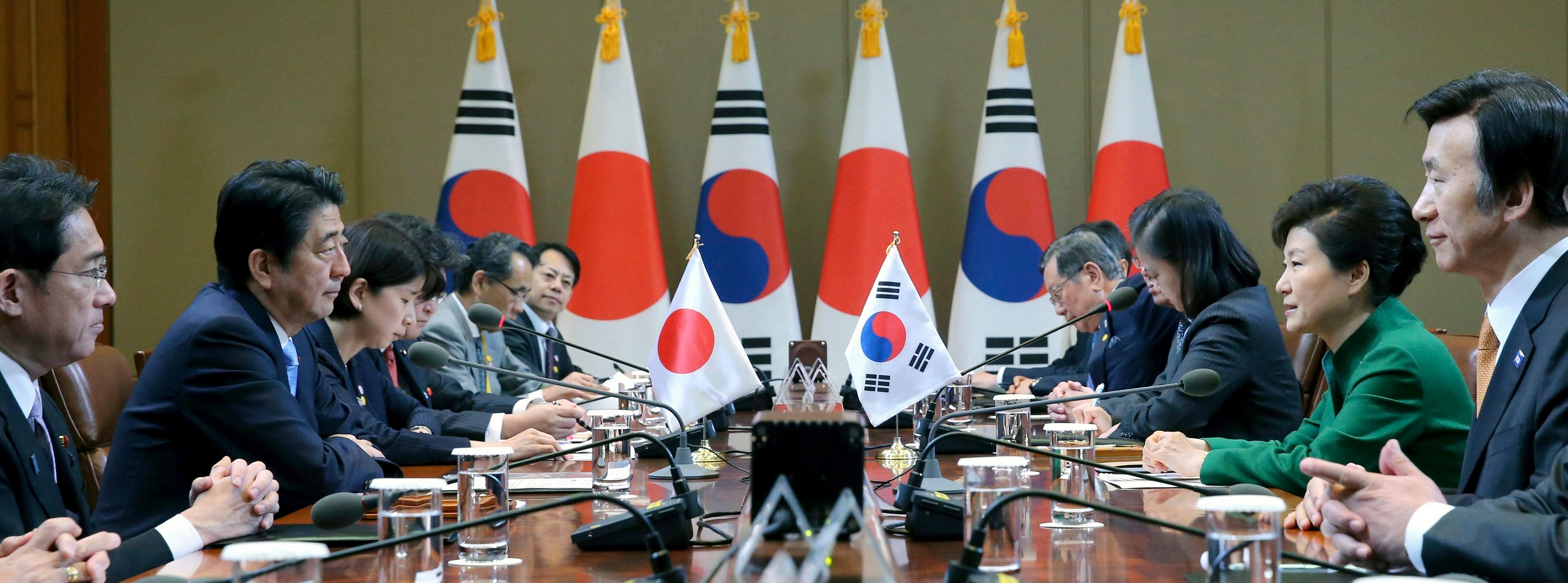South Korean President Park Geun Hye and Japanese Prime Minister Shinzo Abe agreed to speed up talks on the "comfort women" issue at their first summit yesterday, as the two countries sought to repair relations soured by historical disputes.
Their one-on-one meeting followed a trilateral summit with Chinese Premier Li Keqiang on Sunday, which marked the resumption of three-way dialogue and cooperation after a period of strained ties.
Stressing the importance of trust in diplomacy, Ms Park expressed hope that the bilateral summit would not only provide an opportunity for both countries to improve ties, but also help to "heal painful history", the presidential office said.
She added that the issue of compensation for Korean women who were forced by Japanese soldiers to become wartime sex slaves - euphemistically called comfort women - was the "biggest stumbling block" in their relations and must be resolved as soon as possible.
For his part, Mr Abe called for a frank exchange of opinions and joint efforts to improve ties and cooperation. He told reporters after the 45-minute summit that he would seek to resolve the comfort women issue swiftly, and that it should not "leave an obstacle to our future generation".

The two leaders also pledged to accelerate negotiations in regional trade agreements, including the trilateral deal with China, work together against North Korea's nuclear programmes, and strengthen cooperation with the United States, their mutual security ally. Mr Abe called for joint efforts with the US to maintain an open, free and peaceful South China Sea, a Japanese official said.
The first Park-Abe meeting was a big step towards easing festering tensions between the neighbours owing to unresolved historical issues, including a territorial dispute.
Since she took office in 2013, Ms Park had taken a hard stance towards Japan, refusing any contact unless Tokyo made the first move to resolve the wartime issue. South Korea also deems that Japan has not done enough to atone for its war atrocities and 35 years of colonial rule of the Korean peninsula.
But Ms Park appears to have softened her stance under pressure from Washington.
With Tokyo passing Bills in September to expand its military role overseas, experts say Seoul can no longer afford to isolate itself and must return to the negotiating table for pragmatic reasons - to boost trade, investment and tourism. Trade with Japan has shrunk from US$108 billion in 2011 to US$85.9 billion (S$120 billion) last year. Tourism numbers have also fallen - about 2.28 million tourists from Japan visited South Korea last year, a 17 per cent drop from 2013.
Reports last week painted the mood between the two governments as tense, as officials rushed to work out the agenda for the summit, which would end with no joint press conference or a luncheon.
But Ms Park and Mr Abe were all smiles yesterday.
It could be "all optics", said Dr Bong Young Shik, a senior research fellow at The Asan Institute for Policy Studies. "It's good that they put up a smile for the cameras, but nothing has changed."
It remains unclear how Seoul and Tokyo will resolve the comfort women issue, but Ms Park's office said they hope to have results by the end of the year, as 2015 marks 50 years of post-war diplomatic ties between the two neighbours.
Dr Lee Myon Woo from the Sejong Institute praised Ms Park for going into talks with Mr Abe despite knowing it would be difficult.
"It's courage on her part. There will be criticism from the opposition that we got nothing out of the talks... but it's a good start," he said.
SEE TOP OF THE NEWS, OPINION
